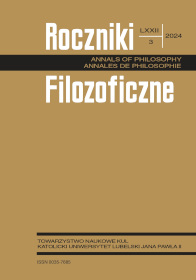Moral Perfection and Freedom in the Philosophy of Anthony Ashley Cooper, Third Earl of Shaftesbury
Moral Perfection and Freedom in the Philosophy of Anthony Ashley Cooper, Third Earl of Shaftesbury
Author(s): Adam GrzelińskiSubject(s): Philosophy, History of Philosophy, Early Modern Philosophy
Published by: Towarzystwo Naukowe KUL & Katolicki Uniwersytet Lubelski Jana Pawła II
Keywords: Anthony Ashley Cooper Shaftesbury; personal identity; beauty; virtue; freedom; freethinking
Summary/Abstract: In the article, I analyze the significance of moral disposition and freedom concepts in the philosophy of Anthony Ashley Cooper, 3rd Earl of Shaftesbury (1671–1713), and their connec-tion to the issues of personal identity and aesthetic experience. I point out that personal identity and freedom are not inherently given to a person but rather the goal of personality development. In this way, I compliment the interpretation presented by Laurent Jaffro and Ruth Boeker, indicating that the moral rigour characteristic of the Stoic stance is mitigated in Shaftesbury’s view by the belief in the sympathy that connects people and the importance he attaches to the experience of beauty. Shaftesbury thus understands freedom as the result of self-improvement and internal teleological determination of the person, as well as political freedom, which is the outcome of free public debate. The postulate of social and political liberty links Shaftesbury with freethinkers such as John Toland and Anthony Collins.
Journal: Roczniki Filozoficzne
- Issue Year: 72/2024
- Issue No: 3
- Page Range: 89-108
- Page Count: 20
- Language: English

